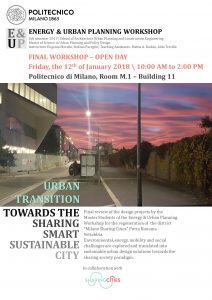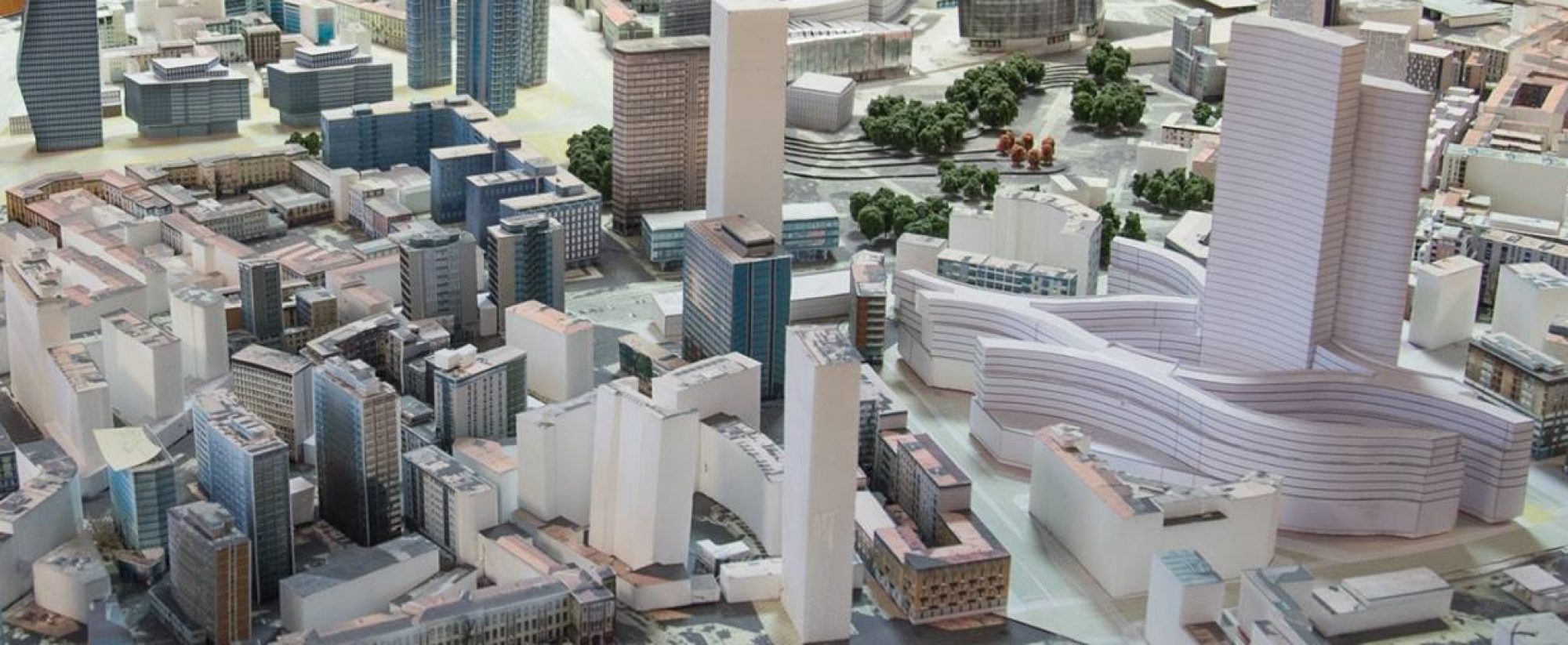Academic Year 2017/18
Urban Transition: Towards the Sustainable, Sharing and Smart City
Milano | Italy
The workshop proposes solutions for the regeneration of the district “Milano Sharing Cities” Porta Romana – Vettabbia. Environmental, energy, mobility and social challenges are explored and translated into sustainable urban design solutions towards the sharing society paradigm.
Topics
The workshop poses the question how should we act to achieve more sustainable urban environments. We will explore two main ways to approach this question: one is related to the policies that the city can adopt in order to promote more environmental-friendly practices; the second one is related to the physical design of the urban environment and how this can influence sustainability.
The objective of the studio is twofold: first, to provide a basic knowledge on the topic of sustainability at the urban scale (policies and design) and second, to explore possible future scenarios through a design project that intentionally takes into account the implications of the different urban forms for the construction of specific environment and energy-oriented urban strategies. The two topics of which policies and which design towards urban sustainability will frame the structure of the course and organize the calendar of the lectures.
Context – space for action
Core principles and inspiration for the design brief assigned this year will be the crossing of urban sustainability and smartness principles, based on the recent theoretical and policy framework as follows:
- The Sustainable Development Goals (SDGs) promoted by the United Nations in 2015, aiming at paving the path towards the Agenda 2030 (http://www.undp.org/content/undp/en/home/sustainable-development-goals.html) represents the holistic framework for action. In particular the course deals with topics concerning the UN Sustainable Development Goal number 11, Sustainable Cities and Communities (SDG11); related goals which are relevant for our work are also SDG12, SDG13 and SDG7. We will address if and how SDGs and specific targets can be effectively be applied at the urban scale.
- How cities can address Urban Resilience, Mitigation and Adaptation to Climate Change is a second mayor concern for our design activities. Can cities play a major role and promote sound energy transition solutions, reduce risk and vulnerability and increase human well-being and environmental quality of our environment? The European strategies for mitigation and adaptation will represent a starting point for including resiliency into design concept and provide tangible solutions. Recent experiences of European cities with Sustainable Energy Action Plans and Climate Action Plans will be investigated having in mind the local context of the Metropolitan City of Milan (its background, experience and challenges).
- Finally, the emerging concept of Sharing Cities and collaborative consumption is emerging as a potential paradigm shift in urban planning towards the design of a more sustainable urban environment. In fact, sharing items, services, time and space thanks to the advancement of ICT (diffused location-based technologies) represents a new dimension for the Smart City and the Internet of Things, thanks to the stronger triangulation among people (citizens as sensors through smartphones), diffused big data and the physical infrastructure that equips the space with smart services and technologies. Will sharing re-shape the urban structure in the future? The design site is currently undergoing an experimental smart city project named ‘Sharing Cities’, funded by the European Research Council under the Horizon 2020 Programme: local stakeholders and project partners will be invited to present and discuss the challenges and first achievements of the current activities (For more information, please visit sharingcities.eu, www.milano.sharingcities.it).
 12/01/2018 | Energy & Urban Planning Open Day: Urban transition towards the sharing, smart and sustainable city \ Final review of the design projects by the MSc Students of the studio working on the regeneration of the district “Milano Sharing Cities” Porta Romana – Vettabbia. Environmental, energy, mobility and social challenges are explored and translated into sustainable urban design solutions towards the sharing society paradigm.
12/01/2018 | Energy & Urban Planning Open Day: Urban transition towards the sharing, smart and sustainable city \ Final review of the design projects by the MSc Students of the studio working on the regeneration of the district “Milano Sharing Cities” Porta Romana – Vettabbia. Environmental, energy, mobility and social challenges are explored and translated into sustainable urban design solutions towards the sharing society paradigm.
Students and design projects (coming soon):
Team 01 \ ABBASISHEKAR MARZIYEH, BLANC GUILLAUME MARC SÉBASTIEN, CIANDRINI MARGHERITA, ELDESOKY AHMED HAZEM MAHMOUD
Team 03 \ MARINO GIADA, WEI JIABIN, SHERIF MUSTAFA ABBAS REDHA, MAGAT LÉO ANTOINE RENÉ
Team 04 \ ASIF BISMA, BOZDERELI DICLE, MUZAFFAR WAJIHA ANOOQ,
MURATAJ ADRIANA
Team 05 \ HOU KAIDAN, WANG XIN, MITRA DEBAKSHI, DILKESTAD MARTIN ERIKSEN
Team 06 \ HAN ZEHUA, TANG XIN, GUPTA SAIBA, ZHU MINGMING
Team 07 \ ASCARI JACOPO, BORGHESI FRANCESCA, ROTONDO FEDERICA, SHAKER YAHYA YASSER MOHAMED
Team 08 \ ASFA ELNAZ, DI IORIO FABIO, MATTANA LUCAS LORENZO, THERO ELÉONORE INGRID ANNABELLE
Team 09 \ BEINGOLEA SANCHEZ CARLA PAMELA, SBORLINI ANTONELA ESTEFANIA, TORRES MALLMA SALLY FERNANDA, VALVERDE ARIELA

